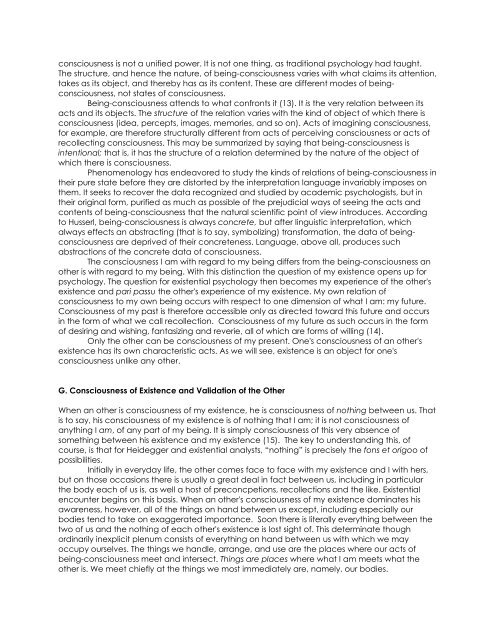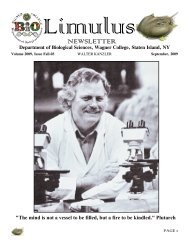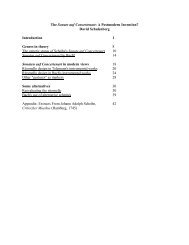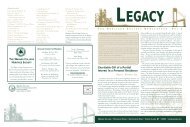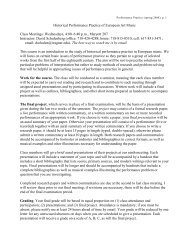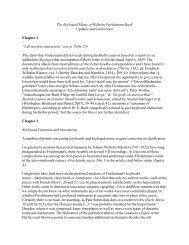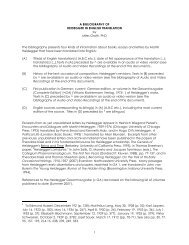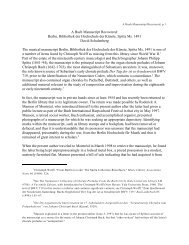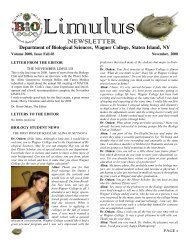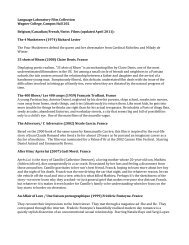SEVEN PAPERS ON EXISTENTIAL ANALYSIS ... - Wagner College
SEVEN PAPERS ON EXISTENTIAL ANALYSIS ... - Wagner College
SEVEN PAPERS ON EXISTENTIAL ANALYSIS ... - Wagner College
You also want an ePaper? Increase the reach of your titles
YUMPU automatically turns print PDFs into web optimized ePapers that Google loves.
consciousness is not a unified power. It is not one thing, as traditional psychology had taught.<br />
The structure, and hence the nature, of being-consciousness varies with what claims its attention,<br />
takes as its object, and thereby has as its content. These are different modes of beingconsciousness,<br />
not states of consciousness.<br />
Being-consciousness attends to what confronts it (13). It is the very relation between its<br />
acts and its objects. The structure of the relation varies with the kind of object of which there is<br />
consciousness (idea, percepts, images, memories, and so on). Acts of imagining consciousness,<br />
for example, are therefore structurally different from acts of perceiving consciousness or acts of<br />
recollecting consciousness. This may be summarized by saying that being-consciousness is<br />
intentional; that is, it has the structure of a relation determined by the nature of the object of<br />
which there is consciousness.<br />
Phenomenology has endeavored to study the kinds of relations of being-consciousness in<br />
their pure state before they are distorted by the interpretation language invariably imposes on<br />
them. It seeks to recover the data recognized and studied by academic psychologists, but in<br />
their original form, purified as much as possible of the prejudicial ways of seeing the acts and<br />
contents of being-consciousness that the natural scientific point of view introduces. According<br />
to Husserl, being-consciousness is always concrete, but after linguistic interpretation, which<br />
always effects an abstracting (that is to say, symbolizing) transformation, the data of beingconsciousness<br />
are deprived of their concreteness. Language, above all, produces such<br />
abstractions of the concrete data of consciousness.<br />
The consciousness I am with regard to my being differs from the being-consciousness an<br />
other is with regard to my being. With this distinction the question of my existence opens up for<br />
psychology. The question for existential psychology then becomes my experience of the other's<br />
existence and pari passu the other's experience of my existence. My own relation of<br />
consciousness to my own being occurs with respect to one dimension of what I am: my future.<br />
Consciousness of my past is therefore accessible only as directed toward this future and occurs<br />
in the form of what we call recollection. Consciousness of my future as such occurs in the form<br />
of desiring and wishing, fantasizing and reverie, all of which are forms of willing (14).<br />
Only the other can be consciousness of my present. One's consciousness of an other's<br />
existence has its own characteristic acts. As we will see, existence is an object for one's<br />
consciousness unlike any other.<br />
G. Consciousness of Existence and Validation of the Other<br />
When an other is consciousness of my existence, he is consciousness of nothing between us. That<br />
is to say, his consciousness of my existence is of nothing that I am; it is not consciousness of<br />
anything I am, of any part of my being. It is simply consciousness of this very absence of<br />
something between his existence and my existence (15). The key to understanding this, of<br />
course, is that for Heidegger and existential analysts, “nothing” is precisely the fons et origoo of<br />
possibilities.<br />
Initially in everyday life, the other comes face to face with my existence and I with hers,<br />
but on those occasions there is usually a great deal in fact between us, including in particular<br />
the body each of us is, as well a host of preconcpetions, recollections and the like. Existential<br />
encounter begins on this basis. When an other's consciousness of my existence dominates his<br />
awareness, however, all of the things on hand between us except, including especially our<br />
bodies tend to take on exaggerated importance. Soon there is literally everything between the<br />
two of us and the nothing of each other's existence is lost sight of. This determinate though<br />
ordinarily inexplicit plenum consists of everything on hand between us with which we may<br />
occupy ourselves. The things we handle, arrange, and use are the places where our acts of<br />
being-consciousness meet and intersect. Things are places where what I am meets what the<br />
other is. We meet chiefly at the things we most immediately are, namely, our bodies.


